Theology \ 1-2

The city of Jerusalem, which is considered sacred by Muslims, Christians and Jews, dates back to BC. It has an ancient history dating back to the 4000s. The dominance of states belonging to these religions in Jerusalem for different periods paved the way for the formation of holy places belonging to three religions in the city.
Various zoning activities carried out by the state in Jerusalem, which came under Ottoman rule in 1517, increased the quality of life of the city. One of the breaking points for Jerusalem in this period of domination that lasted until 1917 was the process that started with the French occupation of Egypt in 1798 and continued until the end of the Kavalalı Mehmed Ali Pasha rebellion in 1841. The emergence of the troubles in different parts of the state, such as the Wahhabi and Greek rebellions, in this time period, caused Jerusalem to be indirectly affected by these events, since it hosted different nations together.
In this study, which deals with the policy of the Ottoman Empire in Jerusalem between 1798-1841, the political events and administrative changes, the prominent activities in the approach of the state to Muslims, the rights granted by the state to non-Muslims and the ways of communication of the people with the state are examined.
Various zoning activities carried out by the state in Jerusalem, which came under Ottoman rule in 1517, increased the quality of life of the city. One of the breaking points for Jerusalem in this period of domination that lasted until 1917 was the process that started with the French occupation of Egypt in 1798 and continued until the end of the Kavalalı Mehmed Ali Pasha rebellion in 1841. The emergence of the troubles in different parts of the state, such as the Wahhabi and Greek rebellions, in this time period, caused Jerusalem to be indirectly affected by these events, since it hosted different nations together.
In this study, which deals with the policy of the Ottoman Empire in Jerusalem between 1798-1841, the political events and administrative changes, the prominent activities in the approach of the state to Muslims, the rights granted by the state to non-Muslims and the ways of communication of the people with the state are examined.
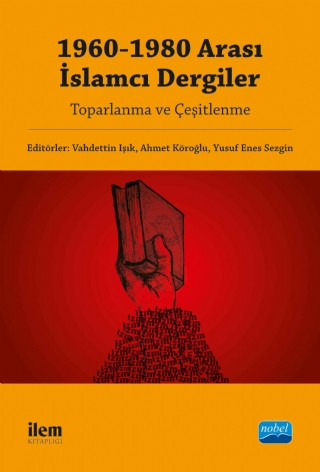
With each passing day, we understand better that the period of introversion shaped around the adventure of the nation-state creates a serious limit in the world of thought. This can be clearly observed when agendas, concepts, and priorities in handling issues are followed. It is possible to say that the period when the signs of overcoming this limitation were seen in the most concrete way was the years between 1960 and 1980, when the multi-party life became relatively permanent. To a certain extent, this period, in which different layers of the public are directly involved in the process, continues to be influential today, both in terms of its specific weight in Turkey's recent history, as well as new searches, channels, institutionalizations, diversifications and discourse differentiations in the history of Islamist thought and publishing. .
In addition, the fact that a significant part of the people who took an active role in the activities of the period are still alive, allows a tested eye to examine a reading to be made from today. Considering that a very important part of the cadres who carry today's Turkey in politics, bureaucracy, civil institutions and intellectual fields are the generations that grew up in the 1960-1980 period, the importance of those years will be better understood. In conclusion, in order to better understand the present, it is quite clear that it is necessary to closely examine the years of 1960-80, which is almost the womb of today. Therefore, both contributing to the understanding of the process we are witnessing and providing the opportunity to create a bridge between these living historical witnesses and new generations reveals both the intention and the value of this study.
In addition, the fact that a significant part of the people who took an active role in the activities of the period are still alive, allows a tested eye to examine a reading to be made from today. Considering that a very important part of the cadres who carry today's Turkey in politics, bureaucracy, civil institutions and intellectual fields are the generations that grew up in the 1960-1980 period, the importance of those years will be better understood. In conclusion, in order to better understand the present, it is quite clear that it is necessary to closely examine the years of 1960-80, which is almost the womb of today. Therefore, both contributing to the understanding of the process we are witnessing and providing the opportunity to create a bridge between these living historical witnesses and new generations reveals both the intention and the value of this study.
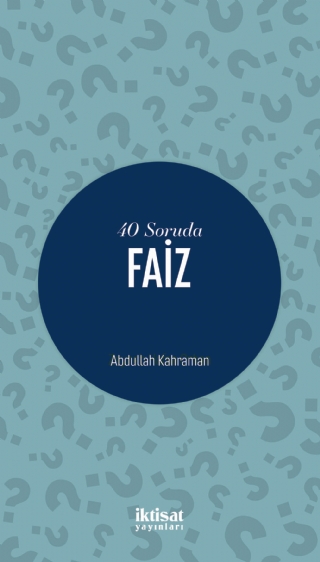
In this book, which is the eighth book in the "What You Need to Know in 40 Questions" series of books that provide short, practical and qualified answers to the questions of the reader about the practices or institutions related to Islamic economics, the subject of interest is discussed around 40 questions from various aspects. One of the main issues of the universal message sent by Allah (c.c.) to humanity is the prohibition of interest/riba. Because, interest is a practice that brings with it many harms, vices and evils in terms of religion, morality, social and economic aspects. The book deals with such an important subject as a whole; It has covered a wide area from its history to its implementation and the systems and discourses formed around it.

In this work, which is the first book in the "What You Need to Know in 40 Questions" series, consisting of books that provide practical, short and qualified answers to the questions of the reader about the practices and institutions in Islamic economics, information about Islamic banking in the world and the basics of the system known as participation banking in our country is presented in a theoretical way around 40 questions. It is given in a format that can be easily understood by people of all levels, rather than depth.
While determining the 40 questions in this book, it has been given importance to include all possible aspects of understanding participation banking and to take into account personal and social experiences with the questions asked so far. During the preparation of the answers to the questions, the experiences, thoughts and concerns of the individuals working in the sector, especially individual customers who have contact with participation banking, as well as the information obtained from the instructors and written materials were taken into account. In order not to tire the reader, a maximum of 400-500 words of explanation is given for each answer. In order to better understand the explanations, figures and figures were used where deemed appropriate. The main feature that distinguishes the book from the existing literature is that the segment it addresses is wider.
While determining the 40 questions in this book, it has been given importance to include all possible aspects of understanding participation banking and to take into account personal and social experiences with the questions asked so far. During the preparation of the answers to the questions, the experiences, thoughts and concerns of the individuals working in the sector, especially individual customers who have contact with participation banking, as well as the information obtained from the instructors and written materials were taken into account. In order not to tire the reader, a maximum of 400-500 words of explanation is given for each answer. In order to better understand the explanations, figures and figures were used where deemed appropriate. The main feature that distinguishes the book from the existing literature is that the segment it addresses is wider.

In this book, which is the seventh book in the "What You Need to Know in 40 Questions" series of books that provide short, practical and qualified answers to the questions of the reader about the practices or institutions related to Islamic economics, the subject of murabaha is handled around 40 questions from various aspects.
Murabaha contract is the type of contract that is mostly applied in the interest-free banking sector, which has been operating in different countries of the world since the 1970s, and largely determines the direction of the interest-free operation. In this context, examining the historical development, stages, problematic points and discussions of such a process will provide the reader with an important background in the field of Islamic economics and especially modern contracts. The questions addressed not only focus on the practical aspects of murabaha, but also aim to reveal the background of the process in many ways. In this respect, the content of the book includes the technical, fiqh, legal, economic and intellectual aspects of the subject.
Murabaha contract is the type of contract that is mostly applied in the interest-free banking sector, which has been operating in different countries of the world since the 1970s, and largely determines the direction of the interest-free operation. In this context, examining the historical development, stages, problematic points and discussions of such a process will provide the reader with an important background in the field of Islamic economics and especially modern contracts. The questions addressed not only focus on the practical aspects of murabaha, but also aim to reveal the background of the process in many ways. In this respect, the content of the book includes the technical, fiqh, legal, economic and intellectual aspects of the subject.

In this book, which is the sixth book in the "What You Need to Know in 40 Questions" series of books that provide short, practical and qualified answers to the questions of the reader about the practices or institutions related to Islamic economics, the subject of sukök and the stock market is discussed around 40 questions from various aspects.
Sukuk and stock market transactions, which are a special method of traditional securitization, are among the most important financial engineering issues of our time. As the issue is current, it is also quite intricate, comprehensive and variable. For this reason, the book presents these two subjects in an up-to-date framework that can be understood by people of all levels, with its fluent and plain language. The most important feature of the book compared to its counterparts is that it not only examines the subject from a descriptive and technical point of view, but also criticizes it in terms of jurisprudence.
Sukuk and stock market transactions, which are a special method of traditional securitization, are among the most important financial engineering issues of our time. As the issue is current, it is also quite intricate, comprehensive and variable. For this reason, the book presents these two subjects in an up-to-date framework that can be understood by people of all levels, with its fluent and plain language. The most important feature of the book compared to its counterparts is that it not only examines the subject from a descriptive and technical point of view, but also criticizes it in terms of jurisprudence.

This book has been prepared to deal with the ways in which otherness transforms into excluded otherness and to discuss this within moral thought. Because if a moral relationship is not established with the existence of the other, the alienation of the other emerges.
Today, problems arising from otherness occupy the agenda all over the globe. Xenophobia, ethnocentrism, racism, religious fanaticism, Islamophobia and nationalism are among the rising threats of our age. While nation states resort to identity-reinforcing policies with exaggerated security discourses to overcome their legitimacy crisis,
On the other hand, the socio-cultural crises faced are pushing the masses towards marginalizing language. Increasing global conflicts and the resulting migration waves bring up traumatic encounters with someone else. In this context, there is a need for a new perspective on morality and the other. If the existence of someone else, who has a moral idea in his essence, is taken as the basis of human life, a recognition can take place without othering, and this recognition can bring about a moral obligation.
Within the framework of this perspective, there are articles in the book that deal with the concepts and debates about the other/other in modern philosophy and Islamic thought.
is. Thus, it is aimed to create a new approach as well as a general and comparative perspective.
Contributors
Ahmet Ayhan Çitil • Burhanettin Tatar • Cafer Sadik Yaran • Kasım Küçükalp Lütfi Sunar • Ömer Türker • Özkan Gözel • Selami Varlık
Today, problems arising from otherness occupy the agenda all over the globe. Xenophobia, ethnocentrism, racism, religious fanaticism, Islamophobia and nationalism are among the rising threats of our age. While nation states resort to identity-reinforcing policies with exaggerated security discourses to overcome their legitimacy crisis,
On the other hand, the socio-cultural crises faced are pushing the masses towards marginalizing language. Increasing global conflicts and the resulting migration waves bring up traumatic encounters with someone else. In this context, there is a need for a new perspective on morality and the other. If the existence of someone else, who has a moral idea in his essence, is taken as the basis of human life, a recognition can take place without othering, and this recognition can bring about a moral obligation.
Within the framework of this perspective, there are articles in the book that deal with the concepts and debates about the other/other in modern philosophy and Islamic thought.
is. Thus, it is aimed to create a new approach as well as a general and comparative perspective.
Contributors
Ahmet Ayhan Çitil • Burhanettin Tatar • Cafer Sadik Yaran • Kasım Küçükalp Lütfi Sunar • Ömer Türker • Özkan Gözel • Selami Varlık

One of the most important results of the transformation of human conceptions produced in the classical world in the modern period is that people change their expectations and hopes about themselves. This situation both affected the hierarchy of questions and required a new set of questions to be asked in the field of ethics, as in many other fields. In this context, especially in the last half century, the reason for human morality has become questionable and some movements have begun to evaluate morality as a purely conscientious condition.
As long as morality is understood as a phenomenon completely related to the conscience of the individual, the relationship between individuals or the outward aspect of morality should be considered as a problem of politics rather than morality. In this case, a sanction can be mentioned as long as the situations to be considered as immoral fall into the field of law. However, since this result is essentially an extension or inevitable result of a certain conception of man and society, it requires to be considered in terms of different conceptions of man and society. In the book in your hand, you will find the texts of the conferences held in the "Conversations on Moral Sanction" series held within the Islamic Moral Thought Project in 2015 in order to question the relationship between morality and sanction.
As long as morality is understood as a phenomenon completely related to the conscience of the individual, the relationship between individuals or the outward aspect of morality should be considered as a problem of politics rather than morality. In this case, a sanction can be mentioned as long as the situations to be considered as immoral fall into the field of law. However, since this result is essentially an extension or inevitable result of a certain conception of man and society, it requires to be considered in terms of different conceptions of man and society. In the book in your hand, you will find the texts of the conferences held in the "Conversations on Moral Sanction" series held within the Islamic Moral Thought Project in 2015 in order to question the relationship between morality and sanction.
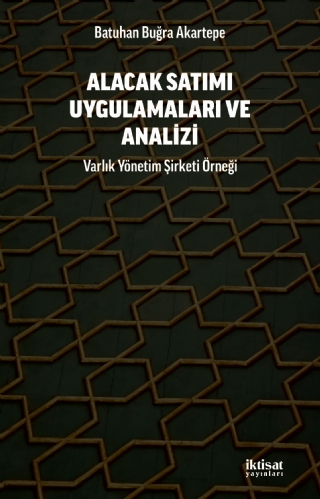
In the commercial relations that human beings have entered, they can pay the price of the products they buy in cash, or they can pay them in deferred payment by way of borrowing. Today, the majority of commercial relations are made by borrowing method and the maturity of the debts in question is long, causing the person or institutions in the position of creditors to have cash problems. The creditor party sells the receivables in question, which we expect to be collected from the debtor, in order to meet his cash needs and to eliminate the loss in the best way possible due to the debtors' insolvency. The book evaluates this practice, which has become widespread because it is a current issue that concerns the majority of the society, in terms of Islamic law. The amount of debt in the economies has increased as a result of the fact that commercial dyestuffs are not based on cash payments and are carried out mostly by borrowing. Due to the effects of economic crises and other factors, difficulties were experienced in repayment of debts and the loss of the creditor came to the fore. Various methods have been used to eliminate this damage. One of the theories operating in this context is the asset management companies that come to the forefront with their assignment of receivables. The purpose of this book, which deals with the assignment of receivables practices performed by asset management companies, is to determine the principles and provisions of Islamic law that are revealed from the subject of assignment of receivables, to analyze the activities of asset management companies in the field of application, and finally to evaluate the current practice according to the principles of Islamic law.
In the book, the sources of the Shafii, Hanteli, Maliki and Zahiri sects were also examined in order to evaluate the views put forward about the receivables sales transactions as the basis, as well as the views of the Hanafi sect.
In the book, the sources of the Shafii, Hanteli, Maliki and Zahiri sects were also examined in order to evaluate the views put forward about the receivables sales transactions as the basis, as well as the views of the Hanafi sect.
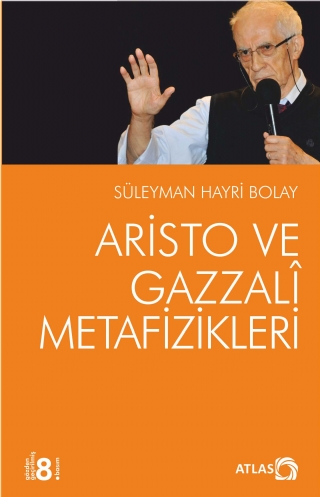
This work, which has reached its seventh edition, broke new ground in some respects in Turkey. Because, until this work, no in-depth comparison of the philosophical views of the great and basic names of Eastern/Islamic and Western thought has been made in our country. Consequently, this study not only sets an example by comparing the metaphysical concepts of Aristotle and Ghazali and the main ideas they contain, but also clearly shows what a great thinker like Ghazali took from Aristotle, what he did not take, and where he opposed his views. demonstrated way. While doing this, he revealed that al-Ghazali's claim that he stopped thinking in the Islamic world is unfounded, and also revealed how he systematically solved the problems he dealt with one by one.
Comparing the two great summits of the world of philosophy and thought in Turkey is interesting to anyone who is interested in the subject. The fact that such a heavily-themed book has reached its sixth edition is a testament to the interest shown to it. We hope that this work, which became a classic before it reached a quarter of a century, will gain the same attention from now on. By reprinting such a work, Nobel Academic Publishing makes a great contribution to our history of thought.
Comparing the two great summits of the world of philosophy and thought in Turkey is interesting to anyone who is interested in the subject. The fact that such a heavily-themed book has reached its sixth edition is a testament to the interest shown to it. We hope that this work, which became a classic before it reached a quarter of a century, will gain the same attention from now on. By reprinting such a work, Nobel Academic Publishing makes a great contribution to our history of thought.
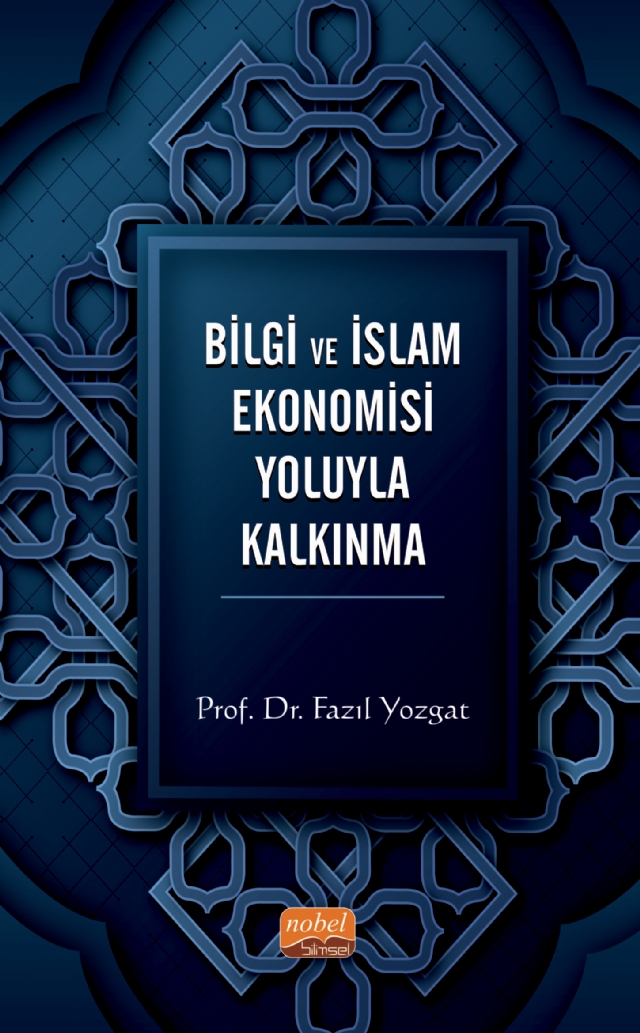
In this study, development through knowledge and Islamic economics is examined in a theoretical and practical context. In the words of Francis Bacon, “Knowledge is power”. The way to be strong in every field is through knowledge. The work of the Royal Society was one of the important factors in Britain's dominance in the world at the turn of the century. Despite the social and political turmoil, Académie Française did not break its system and led France to become an economic and social power. The German Academy of Sciences, the Italian Accademia dei Lincei and the Royal Swedish Academy of Sciences have played a similar role in their countries. The most important work that prepared the infrastructure for Japan to become what it is today is a six-volume report prepared by the Iwakura delegation as a result of examining the countries they have traveled to, especially the USA. For us, the dissolution of Encümen-i Daniş after 12 years, for an uncertain reason, is a serious breaking point. The proposals of movements such as the Young Turks, who were influenced by the West since the Tanzima, to change with political discourses rather than science and development, were not consistent in the ordinary flow of political and social life.
Again, in this study, the basic concepts related to Islamic economics are analyzed in an analytical framework. In the words of Cemil Meriç, "Every recipe is a falsification". The basic concepts of Islamic economics have been analyzed without distorting the meaning as much as possible. Because the basic terms related to economic life are universal and concern all Muslims. If Islamic countries cannot find a solution to their economic problems despite their natural wealth, there are some structural deficiencies. In this framework, evaluations were made about the efficient use of labor and the application of the methods applied by international organizations in its contribution to production in our country. With this work, it is aimed to contribute to the Islamic intellectual golden ring in order to "compete in charity" and "make the world prosperous" with the motto of "seeking the knowledge that is the believer's lost property" and "the hand that gives is superior to the hand that receives".
Again, in this study, the basic concepts related to Islamic economics are analyzed in an analytical framework. In the words of Cemil Meriç, "Every recipe is a falsification". The basic concepts of Islamic economics have been analyzed without distorting the meaning as much as possible. Because the basic terms related to economic life are universal and concern all Muslims. If Islamic countries cannot find a solution to their economic problems despite their natural wealth, there are some structural deficiencies. In this framework, evaluations were made about the efficient use of labor and the application of the methods applied by international organizations in its contribution to production in our country. With this work, it is aimed to contribute to the Islamic intellectual golden ring in order to "compete in charity" and "make the world prosperous" with the motto of "seeking the knowledge that is the believer's lost property" and "the hand that gives is superior to the hand that receives".
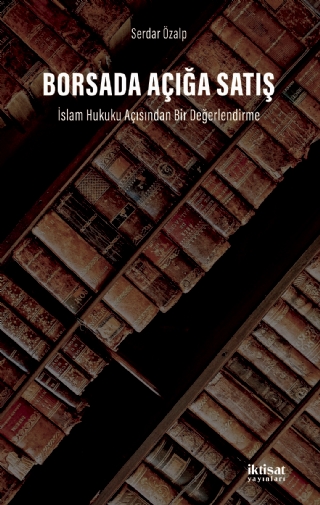
The stock market, which contains many transactions and applications, is important for Islamic economic studies.
As a matter of fact, the stock market, in terms of having shares, debt instruments, futures and options, precious metals and precious stones markets and many products and contracts belonging to these markets it has a rich structure in terms of subject for Islamic economic studies. Although the transactions applied in the stock market are based on a legal basis, the implementation of these transactions brings with it many fiqh issues and problems. The same is true for the short selling transaction, which is one of these transactions. Because the short selling process includes many fiqh issues. For this reason, the aim of the study is to reveal the technical implementation of the short selling process in the stock market.
and to make a fiqh evaluation.
The book deals with the aspects of short selling as a financial product that need legal analysis. In this regard, the subject; It examines the subject, purpose, importance, method and resources of the research in three parts together with the introduction part. In the first chapter, various concepts that can be encountered in short selling transactions are included and the issues that arise in the jurisprudence evaluation of the transaction are briefly touched upon. In the second part of the research, the definitions made for the short selling transaction are classified and discussed, and then the detailed application of the transaction, its types and its economic effects on the market are mentioned. In the third part, four subjects determined in terms of fiqh are discussed.
The evaluation of the process in terms of Islamic law is given.
The book constitutes an important contribution to the Turkish literature, especially considering the lack of a Turkish study dealing with the fiqh aspect of the subject.
As a matter of fact, the stock market, in terms of having shares, debt instruments, futures and options, precious metals and precious stones markets and many products and contracts belonging to these markets it has a rich structure in terms of subject for Islamic economic studies. Although the transactions applied in the stock market are based on a legal basis, the implementation of these transactions brings with it many fiqh issues and problems. The same is true for the short selling transaction, which is one of these transactions. Because the short selling process includes many fiqh issues. For this reason, the aim of the study is to reveal the technical implementation of the short selling process in the stock market.
and to make a fiqh evaluation.
The book deals with the aspects of short selling as a financial product that need legal analysis. In this regard, the subject; It examines the subject, purpose, importance, method and resources of the research in three parts together with the introduction part. In the first chapter, various concepts that can be encountered in short selling transactions are included and the issues that arise in the jurisprudence evaluation of the transaction are briefly touched upon. In the second part of the research, the definitions made for the short selling transaction are classified and discussed, and then the detailed application of the transaction, its types and its economic effects on the market are mentioned. In the third part, four subjects determined in terms of fiqh are discussed.
The evaluation of the process in terms of Islamic law is given.
The book constitutes an important contribution to the Turkish literature, especially considering the lack of a Turkish study dealing with the fiqh aspect of the subject.
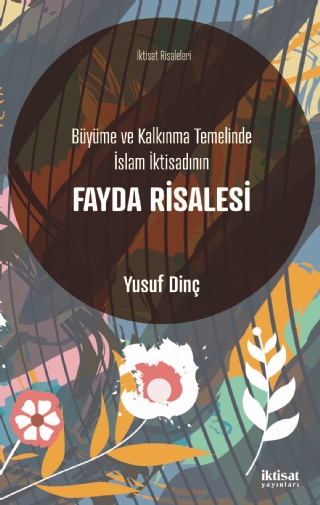
Growth is the most basic phenomenon that we encounter in all areas of life in the capitalist model. Because the model based on supply has indexed its sustainability to growth. In order to spread and sustain the capitalist codes of the system, societies are also organized with the motivation of growth and with rational or irrational codes according to the period. But this ideal, which the masses and societies are dragged after, is a cheap fiction and illusion. Because capitalism is a model of withholding. Growth is only the growth of the capitalist, and its benefits are denied to others. The treatise of utility reconsiders the theory of utility from the perspective of Islamic economics with its concrete (material) and intangible (spiritual) aspects. On the basis of production-consumption indivisibility, the author proposes a solution to the problem of the distribution of the produced income of capitalism with the principle of effort. The work, Hâce Yûsuf b. With the imagination that Ayyub al-Hamedânf placed on the theory of Rötbetü'l Hayat, he explains the economic structure of the utility dimensions ignored by capitalism with mathematical relations. While discussing the philosophical background that feeds the utility theory in the work, the details of the common set of fitra are examined. At the same time, while the financial intermediation paradigm is being questioned, determinations on the collective role of Islamic economic institutions are included.
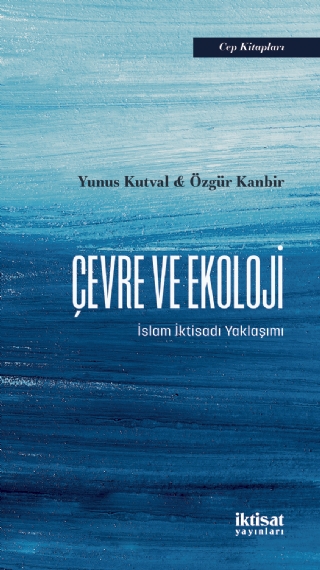
In this book, which is the seventh book in the Pocket Books series, which covers the basic institutions and issues of Islamic economics, the subject of environment and ecology has been tried to be explained in a content that can be easily understood by people of all levels, rather than a theoretical depth. Today, capitalism is largely abstracted from moral values. It sees the damages as human, global warming and environmental disasters. Islamic economics, which is shaped within the framework of the principles of the religion of Islam, rises as an alternative to these corrupt production relations based on exploiting human and nature. According to the religion of Islam, the vicegerent of Allah on earth is man. According to the human model defined by Islamic economics, which is shaped within the framework of Islamic principles, nature should be seen as a trust from the creator, all living and non-living beings should be respected, and economic activities with ethical values should be carried out, not production-consumption oriented. In this sense, the book approaches the subject of ecology and environment from the perspective of Islamic economics and offers solutions on the subject.

The educational institution Darülfünun, which was established as the university leg of the innovation movement in the last period of the Ottoman Empire, is an indicator of many things in the name of innovations and transformations made in the educational sense with the effect of the periodic break. In this sense, the moral lessons taught in Darülfünun also took their share from the transformation and breaking character of the period. In the book, the teachers who teach the moral courses, the syllabus and the works taught in the course constitute the subject of the research in an inseparable integrity. The follow-up of these elements shows the importance given to moral education at the university level at that time, the educational background of the teachers and the intellectual effects they have, as well as the moral understanding they defended with the moral studies they brought into being.
This book; By revealing how the innovations and regulations made in Darülfünun affect the existence of moral courses, how often they can be included in the curriculum, who the teachers who teach the ethics courses are, what education and intellectual inclination they have, what the works of these teachers about morality are, what effects they have, In addition to being a research that seeks answers to questions such as whether the change and transformation observed in moral courses can be extended to Darülfünun in general, it also reveals the transformation of moral understanding that emerged in the process in Darülfünun.
This book; By revealing how the innovations and regulations made in Darülfünun affect the existence of moral courses, how often they can be included in the curriculum, who the teachers who teach the ethics courses are, what education and intellectual inclination they have, what the works of these teachers about morality are, what effects they have, In addition to being a research that seeks answers to questions such as whether the change and transformation observed in moral courses can be extended to Darülfünun in general, it also reveals the transformation of moral understanding that emerged in the process in Darülfünun.
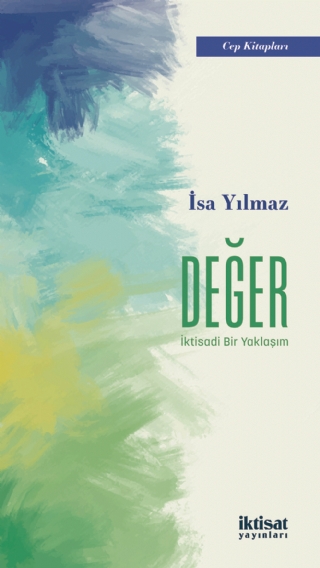
In this work, which is the fifth book of the Pocket Books series, which covers the basic institutions and issues of Islamic economics, the subject of value is tried to be explained in a content that can be understood by people of all levels, together with its theoretical and practical dimensions. In today's world, an economic understanding that we call capitalism, which has become global, seems to be universal and without alternatives, is dominant. Therefore, as people born into the modern world, we establish our economic relations within the limits set for us by capitalist production, consumption and distribution techniques. We think that we have no alternative but to speak the language of the dominant economic understanding and produce practice. We can attribute a suprahistorical role to these concepts by ignoring that the settlement of some concepts in the society in this created language has a historical process and context and that they continue to undergo a continuous change and transformation of meaning. This attitude makes us passive in economic relations and ties our hands in the construction of alternative economic systems. This work is part of the Pocket Books series based on the reinterpretation of basic concepts in economics. With this study, which deals with the concept of value, one of the most important concepts of economics, the meaning of a "value-free" economic thought based on unquestioning acceptance for many of us, the effect of this thought on our daily relations and the construction of a value-laden economic system beyond the current economic understanding. starting points are discussed.
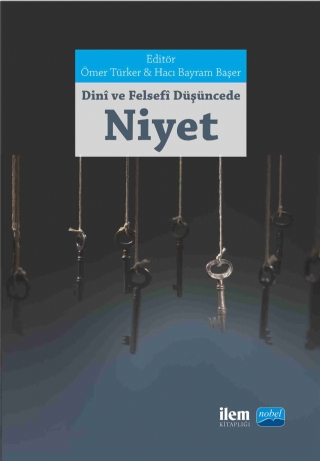
Intention is one of the most fundamental concepts of morality, as one of the key stages in the formation of behavior. In both religious and philosophical thought, intention is considered as the element that adds value to the action and makes it meaningful. In this respect, intention and various states of intention are of decisive importance in terms of both the meaning of being religious and being moral. However, the theoretical dimensions of intention have not been examined in sufficient depth. In this context, the book in your hand aims to identify the views and theories that emerged in the traditions of Islamic thought about the role of intention in the formation of the act; It aims to reveal what and to what extent the contribution of the intention is in the evaluation of the legal, religious and especially the moral value of the act and to clarify the role of the intention in the name and definition given to the perpetrator of an act.
This book, which consists of the works presented at the Workshop on Intention in Religious and Philosophical Thought, held in Istanbul on September 30-October 1, 2016 within the scope of the Islamic Moral Thought Project, covers religious sciences such as fiqh, kalam and mysticism, as well as the subject of intention in Islamic philosophy and Western philosophy. It consists of a total of nine articles examining how it is handled.
This book, which consists of the works presented at the Workshop on Intention in Religious and Philosophical Thought, held in Istanbul on September 30-October 1, 2016 within the scope of the Islamic Moral Thought Project, covers religious sciences such as fiqh, kalam and mysticism, as well as the subject of intention in Islamic philosophy and Western philosophy. It consists of a total of nine articles examining how it is handled.
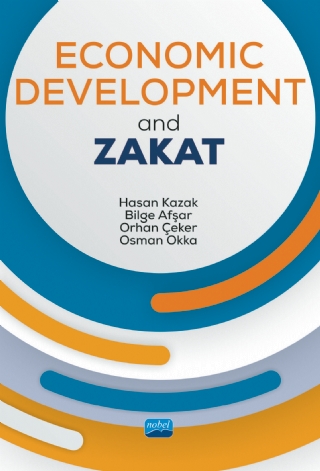
An integrated system, Islam consists of several subsystems. The economy has an important place in these sub-systems. In this respect, Islam also includes regulations on economic growth and development. Undoubtedly, the most important of these regulations is the zakat institution. Zakat was mentioned in many parts of Koran with the prayer, accepted as the pillar of religion in many places and an important message that zakat and prayer should not be separated was given.
The most known and prominent feature of the zakat institution is its contribution to the fair distribution of national income, which is an important indicator in terms of economic development. A lot of work has been written on this subject and this issue has been mentioned in almost every sermon of Islamic scholars. However, the zakat institution has much more significance and benefits in terms of economic growth and development process.
The main purpose of this study is to create a resource for the qualitative and quantitative studies that will be carried out, by revealing other contributions of zakat to economic growth and development, which are not in the foreground but are actually much more functional as well as its other well-known contribution to income distribution.
The most known and prominent feature of the zakat institution is its contribution to the fair distribution of national income, which is an important indicator in terms of economic development. A lot of work has been written on this subject and this issue has been mentioned in almost every sermon of Islamic scholars. However, the zakat institution has much more significance and benefits in terms of economic growth and development process.
The main purpose of this study is to create a resource for the qualitative and quantitative studies that will be carried out, by revealing other contributions of zakat to economic growth and development, which are not in the foreground but are actually much more functional as well as its other well-known contribution to income distribution.
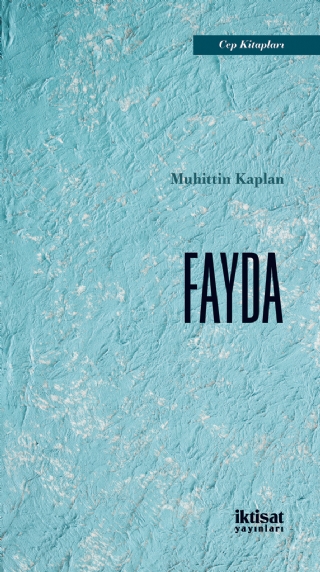
In this book, which is the eighth book in the Pocket Books series, which covers the basic institutions and issues of Islamic economics, the subject of utility is tried to be explained in a content that can be easily understood by people of all levels, rather than a theoretical depth. The book examines the meaning, role and importance of the concept of utility in modern economics and Islamic economic theory, taking into account the evolution of the concept over time. Accordingly, the book is organized into four parts. In the first part; The approach in which utility is defined as the ability of goods to meet human needs is discussed. In the second part; The approach in which benefit is defined as the satisfaction, pleasure and happiness obtained from the consumption of goods and services, that is, the "cardinal approach to benefit" has been examined. In the third part; The modern approach to the concept of utility, the "ordinate to utility" approach, in which utility is included in the analysis as a way to rank consumer preferences, is explained. In the fourth chapter, the framework of the concept of utility in Islamic economics is drawn and its differences from mainstream economics are explained.

Dictionary of Philosophy Doctrines and Terms, mainly to prevent conceptual anarchy; in order to fill a large gap in the philosophy dictionary in the market, to arouse interest in philosophical issues, to warn especially young people against the bad and destructive effects and suggestions of negative currents, to show them the roots of these currents, to facilitate and give clues to those who are in the field of philosophy in the research they want to do. has been written. This dictionary; In addition to being a helpful book especially for philosophy teachers, students, and those who are closely or distantly interested in philosophy, it introduces readers from all fields to certain philosophical doctrines.

Süleyman Hayri Bolay is not a scientist who confines his scientific knowledge and thoughts within the walls of universities. He is a person who shares his writings with people from all layers and with the public since his youth. For this reason, even his works of philosophical intensity have attracted close attention and make an important contribution to the dissemination of philosophical thought.
Süleyman Hayri Bolay now publishes his articles, papers and other researches. These will be six books. The first is "Travels in the World of Philosophy". The second one will be "Travels in Turkish Thought".
“Travels in the World of Philosophy” includes his thoughts on many current issues such as human, family, society, nation, culture, death, democracy, postmodernism, human rights, globalization, national culture and national identity. We believe that the public will read these articles with pleasure.
Our publishing house is proud to publish this work of Süleyman Hayri Bolay, whose well-known and valuable works and writings have been accepted by the public for 45 years.
Süleyman Hayri Bolay now publishes his articles, papers and other researches. These will be six books. The first is "Travels in the World of Philosophy". The second one will be "Travels in Turkish Thought".
“Travels in the World of Philosophy” includes his thoughts on many current issues such as human, family, society, nation, culture, death, democracy, postmodernism, human rights, globalization, national culture and national identity. We believe that the public will read these articles with pleasure.
Our publishing house is proud to publish this work of Süleyman Hayri Bolay, whose well-known and valuable works and writings have been accepted by the public for 45 years.

Philosophy and Sufism consists of articles, papers and interviews that have been written on different occasions before. The common features of the texts are the study of Sufism, which is one of the basic institutions of our culture and civilization, and the values formed on its axis. In almost all chapters, it is seen that looking at philosophy and mystical concepts and themes will lead to a stimulating and enriching result for both fields.
In this book in your hand, mystics such as Mevlana and Yunus Emre are evaluated together with philosophers such as Camus and Bergson. In addition to such a comparative approach, there are original attempts such as evaluating the answers that Sufism can give to current problems as a source and horizon for today. The thesis that Sufis have not an old, timeless worldview and that Sufi contemplation is an ever-fresh answer to world problems is brought to the attention of the reader.
In this book in your hand, mystics such as Mevlana and Yunus Emre are evaluated together with philosophers such as Camus and Bergson. In addition to such a comparative approach, there are original attempts such as evaluating the answers that Sufism can give to current problems as a source and horizon for today. The thesis that Sufis have not an old, timeless worldview and that Sufi contemplation is an ever-fresh answer to world problems is brought to the attention of the reader.

Introduction to Philosophy is written for those seeking an introduction to philosophy as a discipline and intellectual activity. The work aims to make this introduction by introducing philosophy itself, its basic concepts, trends and subjects, and ways of thinking and reasoning specific to philosophy. In the work, which consists of eight chapters, after a first chapter that aims to establish an acquaintance with philosophy, issues related to epistemology, philosophy of science, philosophy of being, ethics, political philosophy, philosophy of religion and philosophy of art are included.
Introduction to Philosophy appeals to all those who want to meet philosophy and want to include philosophy, which we can define as "thinking on big questions in an argumentative and questioning way", into their lives in some way. Written for future teacher candidates. The most important feature of the work is that it deals with the subjects of philosophy with a constructivist approach, that is, the book, Introduction to Philosophy, has been created by using diagrams and visual materials in a way that will enable the student to think about philosophical questions and problems and make the necessary inquiries, instead of conveying ready-made information about the subjects and problems of philosophy.
Introduction to Philosophy appeals to all those who want to meet philosophy and want to include philosophy, which we can define as "thinking on big questions in an argumentative and questioning way", into their lives in some way. Written for future teacher candidates. The most important feature of the work is that it deals with the subjects of philosophy with a constructivist approach, that is, the book, Introduction to Philosophy, has been created by using diagrams and visual materials in a way that will enable the student to think about philosophical questions and problems and make the necessary inquiries, instead of conveying ready-made information about the subjects and problems of philosophy.

This work is the product of a long-term, meticulous and detailed study. It aimed to be different from its counterparts in Turkish philosophy literature in many aspects. With a total of fourteen chapters written by twelve authors, it encompasses almost all of the main problems in different fields of philosophy. The work not only deals with the problems in their context within the history of philosophy, but also interprets them from a contemporary perspective. There are three features that make the work stand out and make it exceptional:
First, it focuses on the very philosophical problems it deals with it examines the problems with an argumentative and dialectical method: First, it presents the reasoning that reveals the problems, then the views and theories for the solution of the problems, then the reasons and arguments that support these views and theories, and then the counter-arguments against the views and theories under the heading of criticism. Thus, the work does not describe a sub-field of philosophy with the views of philosophers, but actively follows the traces of the problems that built that field and brings it to the present day.
Secondly, we can say that this work has not received any share from the sad fate of the content and method disorganization of the edition books. Although the fourteen chapters were written by twelve different authors, the content of all chapters; has the same logical organization, parallel flow of thought, similar subject handling, and equivalent use of concepts and terms. The work has both the collective richness produced by twelve different minds and a systematic integrity as if produced by a single mind.
Third, as far as we know, the visual richness of this work has no analogues in the related philosophical literature. This work in your hand presents nearly three hundred images with a philosophical content that is both informative and questioning by associating them with the subject.
First, it focuses on the very philosophical problems it deals with it examines the problems with an argumentative and dialectical method: First, it presents the reasoning that reveals the problems, then the views and theories for the solution of the problems, then the reasons and arguments that support these views and theories, and then the counter-arguments against the views and theories under the heading of criticism. Thus, the work does not describe a sub-field of philosophy with the views of philosophers, but actively follows the traces of the problems that built that field and brings it to the present day.
Secondly, we can say that this work has not received any share from the sad fate of the content and method disorganization of the edition books. Although the fourteen chapters were written by twelve different authors, the content of all chapters; has the same logical organization, parallel flow of thought, similar subject handling, and equivalent use of concepts and terms. The work has both the collective richness produced by twelve different minds and a systematic integrity as if produced by a single mind.
Third, as far as we know, the visual richness of this work has no analogues in the related philosophical literature. This work in your hand presents nearly three hundred images with a philosophical content that is both informative and questioning by associating them with the subject.

The history of philosophy is, in a sense, the history of the philosopher's search for wisdom, who thinks about philosophy. Contrary to the famous judgment about him, Ghazali is the thinker who saved this search from dogmatism. He is a philosopher who constantly renews the traditional understanding and method, and opens new paths where existing approaches are blocked.
This book has been written with the intention and effort to re-analyze al-Ghazali and his discussions. In the study, the nature of the human being who is the subject of history, and the problems that people experience in the face of the truth they turn to know are examined. It is also discussed what kind of contributions Ghazali's solutions to the problem of 'knowing', which is a dynamic problem, can contribute to today's thought.
This book has been written with the intention and effort to re-analyze al-Ghazali and his discussions. In the study, the nature of the human being who is the subject of history, and the problems that people experience in the face of the truth they turn to know are examined. It is also discussed what kind of contributions Ghazali's solutions to the problem of 'knowing', which is a dynamic problem, can contribute to today's thought.
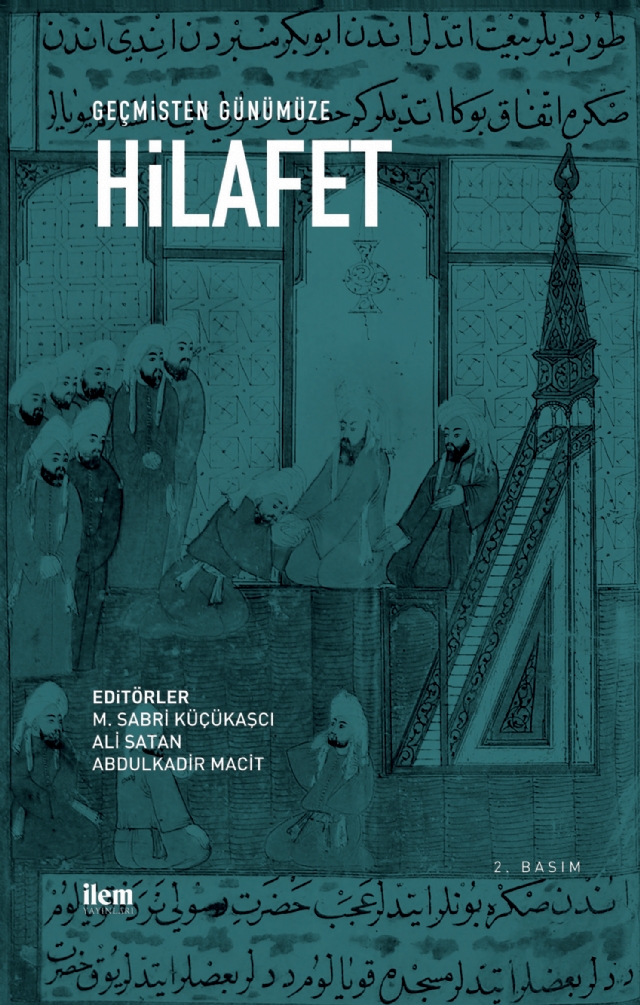
The caliphate, one of the most important institutions in the history of Islam, is among the critical concepts of the literature of Islamic political thought. The way the concept takes place in Islamic sources and its forms that have been the subject of theological and political thought have responded to the states' search for sovereignty and authority since the first periods of Islamic history.
This book, which includes 9 articles, puts forward the issues such as what kind of process the caliphate followed in the pre-modern period and what functions it fulfilled, and what discussions took place about it. It aims to benefit from the past experience in the determination and criticism of current issues.
It is hoped that this study/work, which contains the papers of the workshop held on the occasion of the 500th anniversary of the succession of the Caliphate to the Turks, will be instrumental in many more new/original researches and will serve to commemorate and understand this great historical heritage correctly.
This book, which includes 9 articles, puts forward the issues such as what kind of process the caliphate followed in the pre-modern period and what functions it fulfilled, and what discussions took place about it. It aims to benefit from the past experience in the determination and criticism of current issues.
It is hoped that this study/work, which contains the papers of the workshop held on the occasion of the 500th anniversary of the succession of the Caliphate to the Turks, will be instrumental in many more new/original researches and will serve to commemorate and understand this great historical heritage correctly.

Today, we see that an approach that set out to give a complete and precise explanation of reality gradually loses its power to explain reality and abolish reality itself. The reason why C0VID-19 pushes us to rethink reality, human, god and society as much as other epidemics, but more powerfully than them, is that the understanding that established the modern world has turned reality into a superstition on its way to show reality free from superstitions. It is precisely in this situation that we need to re-remember the reality that we have exchanged for a virtual image and learn from the consequences of this bad trade. This book, which invites us to direct our thinking holistically to reality, to the principles that establish it, and to man's relationship with these principles, says that just such an orientation is a good start for the lessons to be learned.
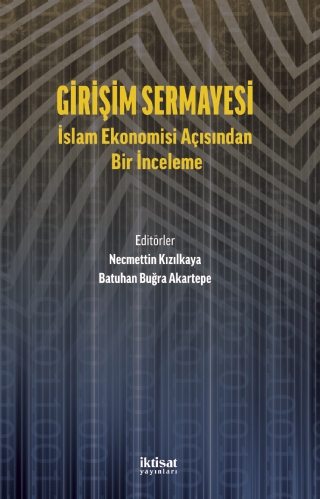
There have been people who are creative and have new ideas throughout history. These ideas led to the development of alternative models outside of the ongoing economic habits and opened the door to innovations.
Today, many innovations, especially in the field of technology, emerge as a result of the maturation of such ideas. Venture/venture capital is an important financial instrument in this respect, which refers to being a partner in these initiatives in order to meet the funding needs of individuals and companies with new ideas. It is an important feature of this partnership that one party takes the risk and aims to earn long-term returns by putting forth the capital of the other party and the creative thinking of the other party. In this respect, venture capital is an alternative model different from classical financing models. The profit-loss-based partnership structure in venture capital is suitable for the objectives that Islamic Economics wants to achieve. For this reason, it is an important investment tool that public and private institutions, universities and companies can apply, especially participation banks. This book in your hand examines the history, current situation, legal structure, economic opportunities, tax and accounting dimensions of venture capital. In this respect, it aims to fill an important gap in this issue, which has been neglected in terms of both theory and practice.
Today, many innovations, especially in the field of technology, emerge as a result of the maturation of such ideas. Venture/venture capital is an important financial instrument in this respect, which refers to being a partner in these initiatives in order to meet the funding needs of individuals and companies with new ideas. It is an important feature of this partnership that one party takes the risk and aims to earn long-term returns by putting forth the capital of the other party and the creative thinking of the other party. In this respect, venture capital is an alternative model different from classical financing models. The profit-loss-based partnership structure in venture capital is suitable for the objectives that Islamic Economics wants to achieve. For this reason, it is an important investment tool that public and private institutions, universities and companies can apply, especially participation banks. This book in your hand examines the history, current situation, legal structure, economic opportunities, tax and accounting dimensions of venture capital. In this respect, it aims to fill an important gap in this issue, which has been neglected in terms of both theory and practice.

This book, called Sufism Today, consists of articles written by writers from different intellectual and academic disciplines who seek solutions for today's problems of humanity, with the aim of reading and interpreting our age based on our own wisdom. In some of them, the proposals of Sufism are discussed on behalf of today and for the whole humanity, and in some of them, evaluations are made about Sufis. The fact that Islam has integrated different geographies, different cultures and different people around the principle of tawhid is re-interpreted today. This book is an invitation to reunite with ancient wisdom in line with today's needs for the solution of human problems around the world.
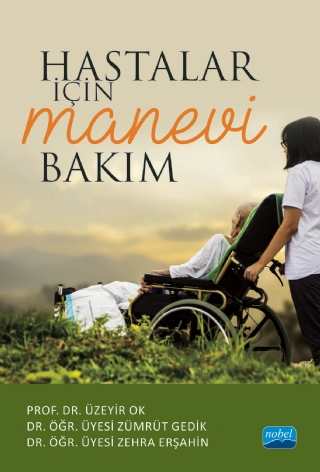
Spiritual care and counseling, which is one of the application areas of the psychology of religion, has a strong potential in human service in different conditions. Religions and spiritual traditions; It is known that they have important roles in coping with the difficulties of life, making sense of life, feeling belonging to a social group, creating an identity and choosing a healthy life for people who belong to them. On the other hand, helping and caring for people living in difficult conditions is a universal human instinct. Helping gratuitously on a voluntary basis is seen as a virtue in almost all life philosophies and religious-spiritual traditions.
In Turkey, studies in the field of spiritual care and counseling, which bring together humanitarian service and religion-spiritualism, have gained momentum in the last 10 years. However, there are very few studies that deal with the subject holistically and in depth and emphasize the scientific basis. This book on spiritual care for the sick in hospitals intends to take existing studies a step further, both in terms of providing an empirical basis and in terms of being dedicated to a particular field.
After explaining the effect of spirituality on human mental and physical health in detail in the book, the spiritual care needs of the patients were compared with the non-sick groups in the study, and the perception levels of the religious officials who still practice spiritual care, their competencies, personality dimensions and field experiences that are effective in their competencies are discussed in depth. In addition to these, in this book, a hospital spiritual care study model has been tried to be created in line with the empirical findings and literature knowledge.
In Turkey, studies in the field of spiritual care and counseling, which bring together humanitarian service and religion-spiritualism, have gained momentum in the last 10 years. However, there are very few studies that deal with the subject holistically and in depth and emphasize the scientific basis. This book on spiritual care for the sick in hospitals intends to take existing studies a step further, both in terms of providing an empirical basis and in terms of being dedicated to a particular field.
After explaining the effect of spirituality on human mental and physical health in detail in the book, the spiritual care needs of the patients were compared with the non-sick groups in the study, and the perception levels of the religious officials who still practice spiritual care, their competencies, personality dimensions and field experiences that are effective in their competencies are discussed in depth. In addition to these, in this book, a hospital spiritual care study model has been tried to be created in line with the empirical findings and literature knowledge.

Although the nomenclature of Islamic Philosophy has an ancient history in terms of meaning, it is a fairly new composition as a name. In the first quarter of the 20th century, Islamic philosophy courses, which found a place in the curriculum as a result of the reforms in the field of education, which was an important pillar of the Ottoman modernization attempts, appear as an important area where this composition was transferred to the field of existence. In a time when Western values and thoughts make their presence felt, and sometimes domination, in the Islamic world, with which arguments Muslim Turkish intellectuals and scientists re-presented and defended their world of thought, how they meet and understand the criticisms and accusations against their realm of existence, and how they are trying to attract and/or dispose of; How they define the history of Islamic philosophy/thought within the current conditions and conditions remains among the intriguing questions.
This study in your hand II. It examines the formation process of philosophy and Islamic philosophy courses in Darülfünun and madrasah, which started to be included in the curriculum with the reform movements that took place in the field of education after the Constitutional Monarchy, and the teachers of these courses, the texts taught in Islamic philosophy courses, and sheds some light on our modernization history.
This study in your hand II. It examines the formation process of philosophy and Islamic philosophy courses in Darülfünun and madrasah, which started to be included in the curriculum with the reform movements that took place in the field of education after the Constitutional Monarchy, and the teachers of these courses, the texts taught in Islamic philosophy courses, and sheds some light on our modernization history.

There are two basic dynamics of shaping contemporary thought in Muslim societies. The first of these is related to internal developments and the other to external conditions. Including? as intellectuals and ulama; They encountered issues such as the meaning and maintenance of tradition, the structure and change of Muslim identity, interpretation of new social problems and producing solutions, and making sense of political developments. In this framework, the main agenda has been formed within the framework of the problematic of Islamic renewal, and the second dynamic is external factors. In this respect, the confrontation with modern technology, industry and bureaucracy in the 19th century caused Muslim societies to go into a serious crisis. While this crisis caused Muslim societies to not be able to maintain their own intellectual lives, the need to respond and overcome it also gave a new form to thought. This communication with the outside has created various intermediate forms by interacting with Islamic concepts and thoughts.
Discussing the basic elements and limits of Islamic thought and examining its counterpart in the contemporary world has become a necessary ground. These discussions are possible by understanding the explanation of the basic concepts of Islamism, its use and transformation throughout history. Since the second half of the 19th century, the concepts of revival, reform, and reform have come to the fore as an offer against the problems that Muslim peoples are dealing with. These are concepts that have a deep-rooted history in the tradition of Islamic thought and politics, although they have been transformed in modern discourse and used in some places before the other.
The workshops, which were held within the scope of the Islamist Journals Project, with the banner of Basic Issues and Concepts, aim to add new dimensions to the rooted discussions of Islamist thought. As a product of this effort, this book is an enhanced version of the presentations made by Mehmet Ali Büyükkara, Özgür Kavak and Murat Kayacan at the "Improvement" workshop held on November 23, 2019. This book is an in-depth analysis of the issues and approaches on which Islamist thought is built. serial offer.
Discussing the basic elements and limits of Islamic thought and examining its counterpart in the contemporary world has become a necessary ground. These discussions are possible by understanding the explanation of the basic concepts of Islamism, its use and transformation throughout history. Since the second half of the 19th century, the concepts of revival, reform, and reform have come to the fore as an offer against the problems that Muslim peoples are dealing with. These are concepts that have a deep-rooted history in the tradition of Islamic thought and politics, although they have been transformed in modern discourse and used in some places before the other.
The workshops, which were held within the scope of the Islamist Journals Project, with the banner of Basic Issues and Concepts, aim to add new dimensions to the rooted discussions of Islamist thought. As a product of this effort, this book is an enhanced version of the presentations made by Mehmet Ali Büyükkara, Özgür Kavak and Murat Kayacan at the "Improvement" workshop held on November 23, 2019. This book is an in-depth analysis of the issues and approaches on which Islamist thought is built. serial offer.

The first Turkish-Islamic States History book is a new and original work on the history of medieval Muslim and Turkish states. The book covers a wide historical period in chronological terms. In this process, the emergence of Islam, the acceptance of the religion of Islam by the Turks, the establishment of Muslim Turkish states and their dominance in the Islamic world; In addition, the organization, culture and civilization issues of these states were discussed. Thus, on the one hand, the political, social and cultural issues that developed in the history of Islam; On the other hand, the politics, organization, culture and civilization of the first Muslim Turkish states were discussed. The topics in the book are written in an original approach and academic style. The First History of Turkish-Islamic States book, prepared with the contribution of many academicians who are experts in their fields, is also a textbook for universities.

From the moment we were convinced that man was born without a given meaning and was defined by the functions or roles he was assigned from the moment he opened his eyes, it became increasingly difficult to expect anything from man. Moreover, such expectations were always confronted with demands for freedom. This book is "What can we expect from a free man?" It grew out of a strong belief that the question can still be asked in a meaningful way. The different conceptions of man in the Islamic tradition of thought, despite all their differences, are optimistic about our expectations of man. However, how this expectation can be grounded. He found different answers within the philosophical, theological, mystical and jurisprudential perspectives in the tradition of Islamic thought.
The study, which includes fourteen articles, investigates the answers given by different disciplines in the tradition of Islamic thought and the different schools within these disciplines to the question of what a human is and what is really expected of him. For these perspectives, which all consider human life as a long story that progresses in a constant test, human is always something that is "being". The main factors that direct our ability to "be", where this ability should lead, and the areas of accrual constitute important topics in the evaluations of what a human being is. The articles in this study proceed through these questions, while investigating the nature of human beings in the traditions of philosophy, theology, mysticism and fiqh, on the other hand, they deepen the current possibilities of these perspectives.
The study, which includes fourteen articles, investigates the answers given by different disciplines in the tradition of Islamic thought and the different schools within these disciplines to the question of what a human is and what is really expected of him. For these perspectives, which all consider human life as a long story that progresses in a constant test, human is always something that is "being". The main factors that direct our ability to "be", where this ability should lead, and the areas of accrual constitute important topics in the evaluations of what a human being is. The articles in this study proceed through these questions, while investigating the nature of human beings in the traditions of philosophy, theology, mysticism and fiqh, on the other hand, they deepen the current possibilities of these perspectives.

Ethics is a field that has been widely discussed in Islamic thought, from practical philosophy to various religious sciences. In this respect, while morality is accepted as one of the philosophical sciences, it is also discussed with different aspects in religious sciences such as hadith, kalam, fiqh and mysticism. In order to examine and present morality, which is at the intersection of multiple disciplines, with all its dimensions, these sciences should be considered in terms of their own internal dynamics. Such an effort seems essential for understanding the morality in Islamic thought with all its dimensions.
In line with this need, roundtable meetings titled "Basic Characteristics of Islamic Moral Literature" were held between March 2013 and March 201A within the scope of the "Islamic Moral Thought Project" carried out by the Scientific Studies Association (ILEM) and the Science Culture and Education Association (ILKE), and the literature on morality has its own discussed in terms of their specifics. This book in your hand consists of the articles of the presentations made at these meetings.
In line with this need, roundtable meetings titled "Basic Characteristics of Islamic Moral Literature" were held between March 2013 and March 201A within the scope of the "Islamic Moral Thought Project" carried out by the Scientific Studies Association (ILEM) and the Science Culture and Education Association (ILKE), and the literature on morality has its own discussed in terms of their specifics. This book in your hand consists of the articles of the presentations made at these meetings.
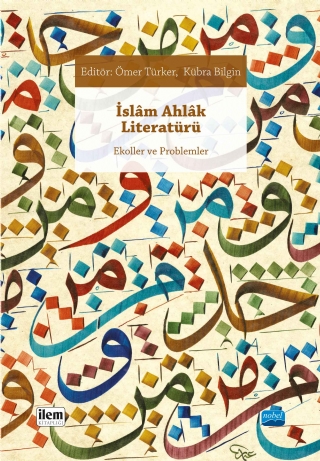
Ethics is a field that has been widely discussed in Islamic thought, from practical philosophy to various religious sciences. In this respect, while morality is accepted as one of the philosophical sciences, it is also discussed with different aspects in religious sciences such as hadith, kalam, fiqh and mysticism. In order to examine and present morality, which is at the intersection of more than one discipline, with all its dimensions, these sciences should be handled in terms of their own internal dynamics. Such an effort seems to be essential for understanding the morality in Islamic thought with all its dimensions.
Based on this need, roundtable meetings titled “Basic Characteristics of Islamic Moral Literature” were held between March 2013 and March 2014 within the scope of the “Islamic Moral Thought Project” carried out by the Scientific Studies Association (ILEM) and the İLKE Science Culture and Education Association, and the literature on ethics was held in the context of its own characteristics. has been discussed. This book in your hand consists of articles from the presentations made at these meetings.
Based on this need, roundtable meetings titled “Basic Characteristics of Islamic Moral Literature” were held between March 2013 and March 2014 within the scope of the “Islamic Moral Thought Project” carried out by the Scientific Studies Association (ILEM) and the İLKE Science Culture and Education Association, and the literature on ethics was held in the context of its own characteristics. has been discussed. This book in your hand consists of articles from the presentations made at these meetings.
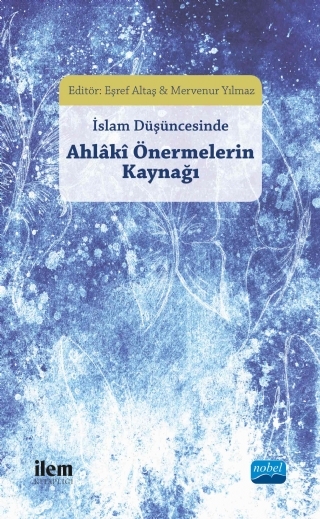
What is the principle or source that enables us to evaluate moral judgments, in other words, moral propositions as good or bad? It is possible to find different answers in the history of thought that this source is pleasure, nature, emotion, reason, intuition, society, and divine will. But where do I get that Justice is good and cruelty is bad? The answer we give to the question brings us face to face with different questions again. For example, if our answer is the mind, what is the characteristic of this mind or which mind is it? Do human nature, emotions, intuition play a role in the society's judgment of good and bad actions regarding actions? What is the role of divine revelation in determining the moral field? In this book, it is aimed to deal with such questions that can be multiplied in relation to moral judgments, mainly under the question of the source of moral propositions.

The debate about whether the biological and hereditary characteristics inherited in the formation and differentiation of personality, which can be expressed as human nature in the most general sense, or whether the diversity of experiences are of fundamental importance, points to a problem that can be traced back to the early periods of philosophy and continues to exist with the same vitality today. The theories of temperament, as a way of explaining human nature, are related to physics and medicine, while their results are directly related to human actions and being in this world.
The book in your hand is an expanded output of the roundtable meetings held in 2015 on the theories of temperament in Islamic thought within the scope of the Islamic Moral Thought Project. Articles in the book; It focuses on the temperament theory, which has a very central place in the understanding of human personality and character, after Hippocrates (375 BC) and Galen (d. 200), and more specifically, the appearance of the problem in some Islamic philosophers and theologians. The book aims to be a start for readers who want to deal with the subject and to contribute to new reading, understanding and interpretation processes that will be made in comparison with the new aspects of the problem.
The book in your hand is an expanded output of the roundtable meetings held in 2015 on the theories of temperament in Islamic thought within the scope of the Islamic Moral Thought Project. Articles in the book; It focuses on the temperament theory, which has a very central place in the understanding of human personality and character, after Hippocrates (375 BC) and Galen (d. 200), and more specifically, the appearance of the problem in some Islamic philosophers and theologians. The book aims to be a start for readers who want to deal with the subject and to contribute to new reading, understanding and interpretation processes that will be made in comparison with the new aspects of the problem.

This study, which is an attempt to analyze the etymology of the concept of love (al-mehabbe), aims to reveal the expansions of the concept of love in Islamic thought regarding its metaphysical, physical, moral and political dimensions.
In the study, by pointing out the difference in nature of the love of Allah and the love of the creatures, the problems that Islamic thinkers discussed around the concept of love were included, thus providing the opportunity to compare the writings of Islamic philosophers, theologians and mystics about love.
This work, which reveals the analysis of the concept of love in the light of the texts written on Islamic thought, aims to inform its readers that love is an indispensable trait for the individual to gain moral competence and to establish social cohesion perfectly.
In the study, by pointing out the difference in nature of the love of Allah and the love of the creatures, the problems that Islamic thinkers discussed around the concept of love were included, thus providing the opportunity to compare the writings of Islamic philosophers, theologians and mystics about love.
This work, which reveals the analysis of the concept of love in the light of the texts written on Islamic thought, aims to inform its readers that love is an indispensable trait for the individual to gain moral competence and to establish social cohesion perfectly.
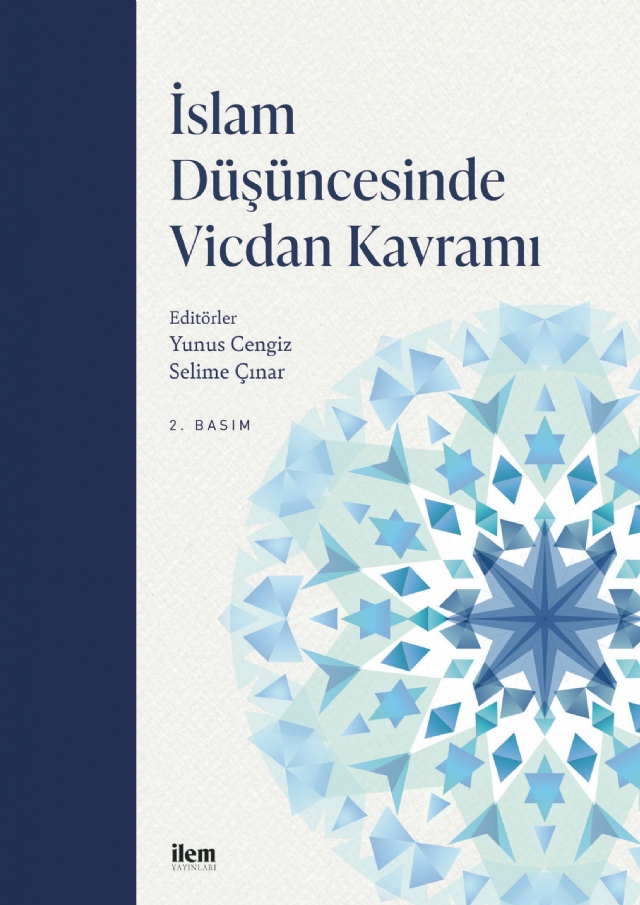
The concept of conscience, which is one of the key concepts for moral thought, is often used in the sense of "moral consciousness" today. When we look at the thought of Islam, it is difficult to say that the word conscience is used in this sense or that it is commonly used with such a content. As a matter of fact, in many texts, this concept is mentioned in a way that corresponds to intuition in an epistemological sense, not moral.
The aim of this study is to process the concept of conscience through Islamic traditions and to determine the equivalent of the concept in these traditions. This situation necessitates us to deal with the texts that aim to analyze the mental states and their practical consequences that provide the moral awareness of the actor against an action, regardless of whether the conscience is literal or not. If we do this, we will not only find the opportunity to reinterpret the classical texts on moral psychology, but also contribute to the reproduction of Islamic moral philosophy.
In the articles included in this book, which consists of the works presented at the Conscience in Islamic Thought Workshop hosted by İLEM-ILKE on June 3-4, 2016 within the scope of the Islamic Moral Thought Project, the way of problematizing the inner state that encourages people to act correctly, their reflections in different fields and psychological -theological foundations are discussed in terms of relevant traditions.
The aim of this study is to process the concept of conscience through Islamic traditions and to determine the equivalent of the concept in these traditions. This situation necessitates us to deal with the texts that aim to analyze the mental states and their practical consequences that provide the moral awareness of the actor against an action, regardless of whether the conscience is literal or not. If we do this, we will not only find the opportunity to reinterpret the classical texts on moral psychology, but also contribute to the reproduction of Islamic moral philosophy.
In the articles included in this book, which consists of the works presented at the Conscience in Islamic Thought Workshop hosted by İLEM-ILKE on June 3-4, 2016 within the scope of the Islamic Moral Thought Project, the way of problematizing the inner state that encourages people to act correctly, their reflections in different fields and psychological -theological foundations are discussed in terms of relevant traditions.

The book in your hand may sound a bit ambitious, but it is an attempt at a philosophical interpretation of Islam. What this means for us is that today's people want to test knowledge with its philosophical dimensions. Moreover, let this type of knowledge be the field of metaphysical knowledge. One of the most important approaches of contemporary epistemology is the principle of verification. In the nature of this principle, whether a proposition is true or not is directly proportional to whether the content of that proposition is supported by facts. What is wanted to be done here is to apply the principle of verification on the data of religion with a philosophical methodology. The starting point of such an attempt is to reveal the importance of the philosophical dimension of the data of revelation, as well as the principles of belief and worship of religion. In order for today's people to believe in religious or philosophical knowledge and to accept its truth, they must be convinced with their mental, logical and philosophical proofs. In other words, the "why" is more important than the "how". In this study, we tried to deal with the data of revelation in this way. What is wanted to be done here is to ground the revelation data of the religion of Islam with its mental and philosophical dimensions, to reveal the "why" and "why", in short, to focus on "wisdom", and leave the "how" to the experts. This work of ours is not a repetition of what is known or a longing for some past achievements. It is not an effort to renew our faith by trying to reconcile scientific developments or discoveries with the verses of the Qur'an. What is desired to be done here is to consider a truth with different dimensions. While we are trying to rediscover our science, wisdom, philosophy and civilization, it is necessary to see the stones we will lay on this path as an effort to create a solid ground.
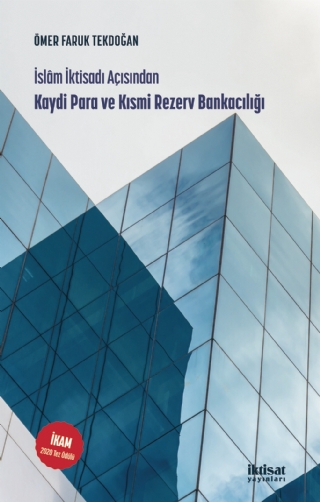
The partial reserve system, which we can call the basis of modern finance, has been the subject of discussion from past to present due to its weak structure, the role it played in economic instability and the problems it created. This interest-based system, which ensures that most of the money supply is dematerialized, has led to a macro-ribâ system that envelops economic life. The full reserve system, which was developed as an alternative to this system, could not find its place in practice. From the point of view of Islamic economics, the fact that the current system is riba-oriented and causes an unfair distribution of resources has necessitated the evaluation of the alternatives put forward from this perspective. The fractional reserve system operates based on confidence that commercial banks and central banks will provide sufficient liquidity when needed, and thus in essence it is prone to financial crises.
is weak and fragile. From this perspective in the book, the problems that are claimed to arise in economies with the discovery of fractional reserve banking are examined, the applicability of full reserve banking and how sufficient it is for a solution are examined, and the suitability and drawbacks of both systems in terms of Islamic economics are discussed. In addition, the effect of both banking systems on economic stability was compared using an agent-based simulation model.
is weak and fragile. From this perspective in the book, the problems that are claimed to arise in economies with the discovery of fractional reserve banking are examined, the applicability of full reserve banking and how sufficient it is for a solution are examined, and the suitability and drawbacks of both systems in terms of Islamic economics are discussed. In addition, the effect of both banking systems on economic stability was compared using an agent-based simulation model.
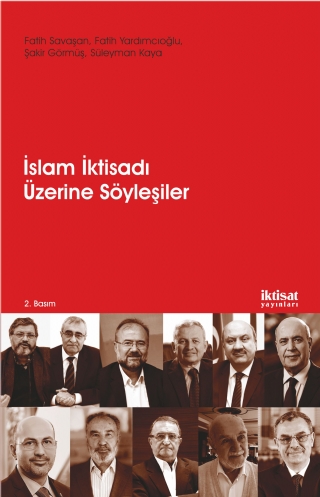
Many issues such as what the economic view of Islam is, whether it offers an economic system, what solutions it provides to people's needs, and through which institutions historically Muslims carry out their economic activities have been discussed by different segments for a long time and still continue to be discussed. Not only theoretical efforts, but also many practical efforts have been put forward and institutions have been established. Sometimes the practice side, led by Islamic banks, directed other theoretical studies, and sometimes the theory tried to influence the practice. On the other hand, with the growth of Islamic finance, regulatory authorities have inevitably been included in this ecosystem. In the end, many stakeholders, interconnected or not, ponder on Islamic economics and finance and contribute to keeping this field on the agenda.
Studies in the field of Islamic economics and finance have increased for Turkey, especially after the 1980s. Islamic lawyers, employees in the Islamic finance sector, regulatory agencies, academics and many more contribute to the field. Among them, some names played leading roles in their own fields and have been influential in the reaching of Islamic economics and finance to a much wider audience today. This book consists of interviews with professors who have worked in this field for many years, industry representatives and regulators operating in the field of Islamic finance.
Studies in the field of Islamic economics and finance have increased for Turkey, especially after the 1980s. Islamic lawyers, employees in the Islamic finance sector, regulatory agencies, academics and many more contribute to the field. Among them, some names played leading roles in their own fields and have been influential in the reaching of Islamic economics and finance to a much wider audience today. This book consists of interviews with professors who have worked in this field for many years, industry representatives and regulators operating in the field of Islamic finance.
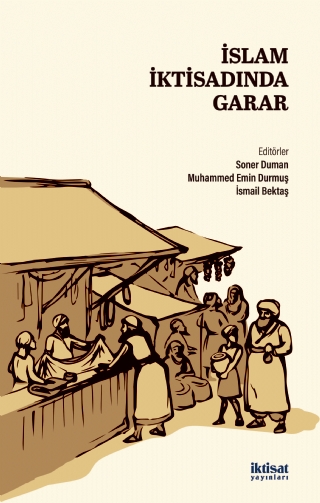
The most basic principles that Islam observes in human relations; observance of justice, prevention of injustice, ensuring social stability, entrusting the trust to those who are competent, open and transparent relations between people, preventing transactions and dispositions that may lead to conflicts between people. These principles also guided the instructions of Islam regarding commercial relations between people. In this context, tortious acts such as theft and extortion are prohibited, as well as interest, verbal or de facto cheating that leads to the exploitation of one party in contracts.
Garar, which is the subject of this book, is also prohibited because it causes commercial relations between people to be carried out in an open and transparent manner and cause conflicts and fights between people. The book consists of the papers presented in the workshop named "Garar in Classical Fiqh and Its Effect on Today's Economic Transactions", which was organized with the aim of addressing many aspects of the ban on garar, which was discussed in the classical fiqh literature and also encountered in modern economic transactions, by the participants, which were developed and converted into articles. This book, in which different authors deal with the prohibition of garar in Islamic fiqh from conceptual, intellectual and methodological perspectives, has been brought together in order to establish a solid link between our classical fiqh heritage and today's economic affairs.
Garar, which is the subject of this book, is also prohibited because it causes commercial relations between people to be carried out in an open and transparent manner and cause conflicts and fights between people. The book consists of the papers presented in the workshop named "Garar in Classical Fiqh and Its Effect on Today's Economic Transactions", which was organized with the aim of addressing many aspects of the ban on garar, which was discussed in the classical fiqh literature and also encountered in modern economic transactions, by the participants, which were developed and converted into articles. This book, in which different authors deal with the prohibition of garar in Islamic fiqh from conceptual, intellectual and methodological perspectives, has been brought together in order to establish a solid link between our classical fiqh heritage and today's economic affairs.
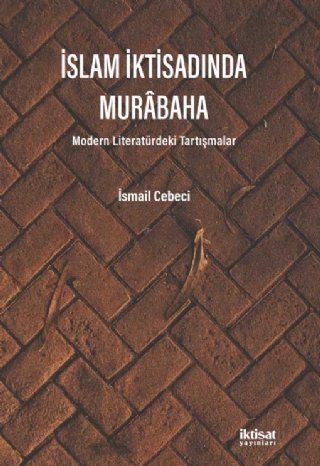
Murabaha contract is one of the most applied and discussed transactions in the interest-free financial system. In the process that has been going on since the 1970s, when interest-free banking began, the subject of murabaha, which has been in the field of interest of many scientific disciplines, especially fiqh and economics, has been an issue that has attracted the attention of the academic community as well as being important for the real sector. The main purpose of this study is to deal with the historical development of such a contract, to follow the stages it went through and to examine the debates about the problematic points it has.
Murabaha, which is known as "production support" and "corporate and individual financing support" in practice in Turkey, is a larger-scale and most widely used transaction today, has common issues with other investment-financing models, as well as many different The fact that it contains a problem point, is the most discussed transaction in the modern period, and shows how a classical contract was modernized are the factors that make this contract important. Murabaha fiqh, economic, social, etc. This study, which aims to address various aspects with a critical and holistic perspective and to reveal the course of reasoning and judgment-making activities in modern Islamic economics problems based on the existing literature, is a candidate to fill an important gap in the literature.
Murabaha, which is known as "production support" and "corporate and individual financing support" in practice in Turkey, is a larger-scale and most widely used transaction today, has common issues with other investment-financing models, as well as many different The fact that it contains a problem point, is the most discussed transaction in the modern period, and shows how a classical contract was modernized are the factors that make this contract important. Murabaha fiqh, economic, social, etc. This study, which aims to address various aspects with a critical and holistic perspective and to reveal the course of reasoning and judgment-making activities in modern Islamic economics problems based on the existing literature, is a candidate to fill an important gap in the literature.

There are many attempts to define the nature of man. The most common and almost agreed upon among these attempts is that man is a political creature. Man is a being who lives in a community, makes sense and establishes himself in a community. However, the transformation of this obligatory union of people into a good and fair system poses an important problem. Various political systems have been developed throughout history to establish and maintain such a social order. One of the most important and urgent problems facing humanity today is the formation of a good, beneficial and just order for everyone.
This work has been prepared in order to draw a theoretical framework for Islamic political thought by using the possibilities and tools of contemporary political science and political philosophy.
This book, which includes 11 articles written by competent academics in the field, aims to provide new expansions of classical origin to Islamic political thought, which has been shaped by Western influence in the modern period. For this reason, it aims to systematically address ancient issues in a conceptual continuity and thus to bring Islamic political thought to the present.
This work has been prepared in order to draw a theoretical framework for Islamic political thought by using the possibilities and tools of contemporary political science and political philosophy.
This book, which includes 11 articles written by competent academics in the field, aims to provide new expansions of classical origin to Islamic political thought, which has been shaped by Western influence in the modern period. For this reason, it aims to systematically address ancient issues in a conceptual continuity and thus to bring Islamic political thought to the present.

In the face of Europe's industrialization revolutions and its formation as developed economies, the Islamic world's inability to fully fulfill its growth and development steps has led to a misconception that Islam hinders development or progress for years. This perception has been expressed from time to time by some circles with good intentions or bad intentions. Is it really so? Does Islam have a religious understanding that only has an aspect towards the hereafter and is completely isolated from worldly life? How should the chapters in the Qur'an and hadiths that describe the dangers of wealth be understood? Does Islam have a relationship with capitalism and socialism? Can a Muslim be rich? Are there any rules for being rich and wealthy? What should be the balance between spending and hedonism? The fact that all these questions are often wrongly answered and misinterpreted by both the Islamic and non-Islamic worlds is an indication that the issue is not fully understood. Although this misunderstanding is considered reasonable by those who are far from the Islamic world, it is very sad that it is misunderstood and interpreted by the Islamic world.
In this study, the subject is evaluated from the perspective of Islam by considering the assumptions and approaches in Max Weber's work, which deals with the relationship between Protestant ethic and capitalism, and which is very popular. Can relationships similar to those established by Max Weber between capitalism and Protestant ethics be valid for the religion of Islam, or can similarities be drawn? In this study, the real Islamic economic system has been tried to be revealed by considering the subject in terms of these relations.
In this study, the subject is evaluated from the perspective of Islam by considering the assumptions and approaches in Max Weber's work, which deals with the relationship between Protestant ethic and capitalism, and which is very popular. Can relationships similar to those established by Max Weber between capitalism and Protestant ethics be valid for the religion of Islam, or can similarities be drawn? In this study, the real Islamic economic system has been tried to be revealed by considering the subject in terms of these relations.
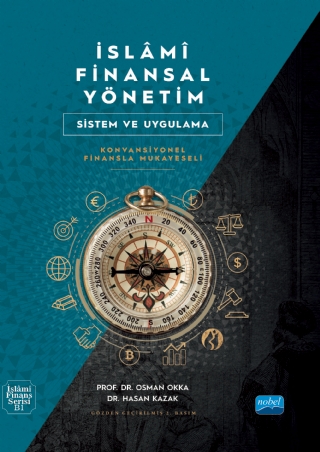
Today, due to the rapid development of the Islamic finance sector and the fact that Islamic funds are approaching 3 trillion dollars, interest in this field has increased gradually, on the one hand, publications in this field have increased, on the other hand, Islamic financial institutions have become institutionalized to a large extent. While all these developments were taking place, the aspect of Islamic finance towards companies together with institutions operating in money and capital markets - that is, studies on the application of national and international companies to ordinary, collective, commandite, limited, joint-stock and holding companies - remained relatively behind. This book has been prepared to meet this need, covering almost all areas of financial management and in comparison with conventional finance. For this reason, the book has an intermediate upper structure.
In the book, the basic principles of finance related to Islamic finance within the framework of Islamic law are presented to the reader in a systematized manner in a systematic way, in comparison with conventional finance, and it is shown in detail how Islamic finance can be applied in all areas of the activities of companies in real life. Thus, it is aimed for the reader to gain knowledge in a structure that can think financially with a numerical and analytical method and solve the financial problems of the company by producing policies in accordance with Islam. Case studies of Islamic finance in the 22nd chapter, that is, case studies, added a different dimension to the book.
In the book, the basic principles of finance related to Islamic finance within the framework of Islamic law are presented to the reader in a systematized manner in a systematic way, in comparison with conventional finance, and it is shown in detail how Islamic finance can be applied in all areas of the activities of companies in real life. Thus, it is aimed for the reader to gain knowledge in a structure that can think financially with a numerical and analytical method and solve the financial problems of the company by producing policies in accordance with Islam. Case studies of Islamic finance in the 22nd chapter, that is, case studies, added a different dimension to the book.
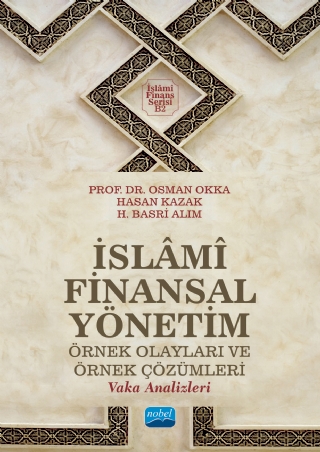
(B-1) Islamic Financial Management: System and Practice (Compared with Conventional Finance) in the first book of the series, what Islamic finance is and its application in today's modern companies (ordinary, collective, commandite, limited, joint-stock, holding companies) by taking into account the Islamic rules on this subject. shape was examined in comparison with conventional firms. Rational behavior and behavior do not change in conventional or Islamic finance. Every person or company tries to act, win, act efficiently in order to be optimal (the best); What is different is that the Islamic financier and manager must act and be successful by taking into account the prohibited and unethical rules according to Islam. As it is known, conventional companies; According to Islam, all kinds of interest, deceitful, morally corrupting, defective, adulterous, causing usurpation of rights, harmful to society, etc., which are considered haram. If they do not engage in activities, they become an Islamic firm. If Islamic companies carry out their activities without considering the harams and prohibitions of Islam, they also turn into conventional companies. Switching between companies is that simple. If an Islamic firm has engaged in haram activities, it first tries to prevent them and at the end of the period, it tries to remove the haram revenues from the firm. In order not to make mistakes, the Islamic financial manager has to know and apply the rules of both conventional and Islamic finance.
In today's economic system, where extreme competition and high capital costs dominate; In order to understand the problems of financial managers and the role of Islamic finance correctly, and then to make the right financial decisions about the company, they need to see real-life financial management problems closely and produce solutions on these problems. These are case studies; It has been prepared to enable our readers to see themselves in the virtual environment of the company, to penetrate deeply into financial management problems, to produce alternative solutions within the framework of Islamic rules and to improve their ability to make the right decision. The book acts as a finance simulator for financiers and those who want to become financiers, as well as company managers. We hope that this book titled (B-2) Islamic Financial Management Case Studies and Case Studies (Case Analysis), which covers 50 case studies, will be useful to you.
In today's economic system, where extreme competition and high capital costs dominate; In order to understand the problems of financial managers and the role of Islamic finance correctly, and then to make the right financial decisions about the company, they need to see real-life financial management problems closely and produce solutions on these problems. These are case studies; It has been prepared to enable our readers to see themselves in the virtual environment of the company, to penetrate deeply into financial management problems, to produce alternative solutions within the framework of Islamic rules and to improve their ability to make the right decision. The book acts as a finance simulator for financiers and those who want to become financiers, as well as company managers. We hope that this book titled (B-2) Islamic Financial Management Case Studies and Case Studies (Case Analysis), which covers 50 case studies, will be useful to you.
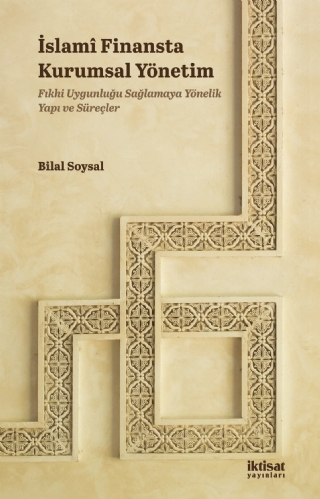
For an Islamic financial institution to survive and grow, it is essential that all stakeholders adopt a corporate governance approach to increase their trust in the institution. An effective corporate governance is necessary for an Islamic financial institution to manage the risk of non-compliance with Fiqh principles and rules, to grow in a healthy way, and to properly protect the interests of all stakeholders. In this context, an important part of corporate governance in Islamic financial institutions is an effective "Fiqh Compliance Management System" aimed at ensuring the compliance of activities with fiqh principles and rules. This book explains the Fiqh Compliance Management System in Islamic financial institutions in detail within the framework of literature and international standards, and the approaches of countries to the subject. it reflects in the context of legal regulations and reveals the situation of Turkey compared to other countries.